|
|
|
Sort Order |
|
|
|
Items / Page
|
|
|
|
|
|
|
| Srl | Item |
| 1 |
ID:
171641
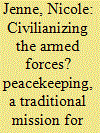

|
|
|
|
|
| Summary/Abstract |
Peacekeeping is widely believed to introduce a civilian element into military culture. However, empirical tests of whether peacekeeping actually yields civilianizing effects on the armed forces are few. Based on the case of Chile, I argue that participation in peacekeeping has failed to lead to fundamental changes in the military’s role perception vis-à-vis civilian actors, despite some practical learning experiences at the individual level. Peacekeeping has been assimilated into the existing warrior model, where civilian actors play only a secondary role.
|
|
|
|
|
|
|
|
|
|
|
|
|
|
|
|
| 2 |
ID:
106198
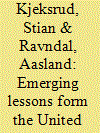

|
|
|
|
|
| Publication |
2011.
|
| Summary/Abstract |
Since December 2008, protection of civilians has been the primary task of the United Nations (UN) mission in the Democratic Republic of Congo (DRC). Guidance on how UN military units can contribute to the protection of civilians has been lacking, however. This has necessitated a bottom-up approach to protection of civilians in which the mission and its partners have developed a series of cross-cutting protection initiatives. The UN military plays a key role in many of them. Based on the findings of a 2010 field study conducted in the DRC, the paper discusses how UN military units can contribute to protection of civilians in three dimensions, namely civil-military cooperation, the use of intelligence, and the use of military force. The aim is to inform the preparation of military contributions to future missions mandated to protect civilians.
|
|
|
|
|
|
|
|
|
|
|
|
|
|
|
|
| 3 |
ID:
170553
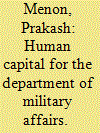

|
|
|
|
|
| Summary/Abstract |
The creation of the Department of Military Affairs (DMA) in the Ministry of Defence portends better civil-military cooperation. That India’s civil-military cooperation was in need of structural reform was never doubted. Yet, the implementation of such reform lacked political will, faced bureaucratic resistance, and was stymied by elements within the armed services. Political will has finally expressed itself and taken three major steps: the institution of the posts of Chief of Defence Staff (CDS) and Permanent Chairman Chiefs of Staff Committee (PC-COSC), and the creation of DMA with the CDS as its ex-officio head. Notably, the DMA is expected to have some optimum mix of civil and military domain experts that would work under a military head who is the Principal Military Adviser to the Defence Minister.
|
|
|
|
|
|
|
|
|
|
|
|
|
|
|
|
| 4 |
ID:
176224
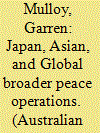

|
|
|
|
|
| Summary/Abstract |
This paper examines Japanese unity of Overseas Despatch Operation (ODO) actors, laws, and operational aspects, interaction with state and institutional actors, ‘4C’ functional regional engagement and concepts of partnership, and Japan’s United Nations Peace Operations-Humanitarian Assistance Disaster Relief Operations (UNPO-HADRO) nexus. Japanese cooperation for dual liberal-international peace and realist security goals within increasing regional strategic competition and nationalist antipathy is examined, particularly in Japan’s ‘poor neighbourhood’. The paper questions why, despite undoubted expertise, Japan has not emerged as a regional UNPO-HADRO development leader, and whether Japanese UNPO-HADRO and ‘pro-active pacifism’ approaches are utilising UNPO-HADRO for Asia-regional strategic competition purposes? Japanese ODO have played important functional engagement, value sharing, and institutional socialisation roles, with integrated legal-civil–military holistic approaches providing models for others and foundations for partnerships. However, despite specialist capacity-building knowledge transfer efforts Asian disquiet remains concerning cooperation and partnership. Japan remains highly risk-averse, raising questions regarding its dependability, and ‘HADRO-CIMIC superpower-aspirations’, or bridging-actor role between Indo-Pacific and ‘Northern-Developed’ practitioners, can be evaluated by Japan’s modest present UNPO actor status. Japanese leadership and initiative is limited by its neighborhood and attendant institutions, but also by its self-perceived identity shaped by historical, alliance, and leadership challenges to manage relative decline.
|
|
|
|
|
|
|
|
|
|
|
|
|
|
|
|
| 5 |
ID:
081051
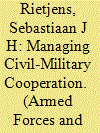

|
|
|
|
|
| Summary/Abstract |
From a management perspective, this article presents a process model to analyze cooperation between military and civilian actors in peace support operations. By means of multiple case study research, the article applies the model to eight partnerships between the Dutch Provincial Reconstruction Team and civilian actors (nongovernmental organizations, district governors, local constructors) in Baghlan, Afghanistan. These partnerships include explosives removal, power plant construction and police training courses. The article shows that civil-military cooperation processes follow six successive steps: decision to cooperate, partner selection, design, implementation, transfer of tasks and responsibilities, and evaluation. It is concluded that there is a lack of unambiguous and useful military guidelines regarding civil-military cooperation; the military are often unaware of other actors operating in the area and their programs, cooperation is frequently supply-based rather than demand-driven, and many military personnel involved in civil-military cooperation have little experience with and training in the subject
|
|
|
|
|
|
|
|
|
|
|
|
|
|
|
|
| 6 |
ID:
104619


|
|
|
|
|
|
|
|